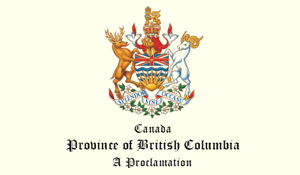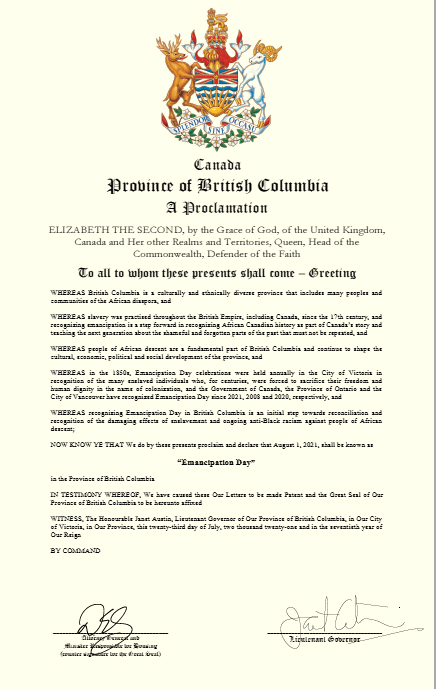Sunday August 1, 2021 | VICTORIA, BC [Updated August 2, 2021 with Parliamentary Secretary’s Statement]
by Mary P Brooke, Editor | Island Social Trends
From this year forward, August 1 will be known as Emancipation Day in British Columbia, marking the day slavery was abolished across Canada in 1834.
The proclamation was signed on July 23, 2021 and promoted by the BC Government this past Thursday, July 29, calling it “an initial step towards reconciliation and recognition of the damaging effects of enslavement and ongoing anti‐Black racism against people of African descent”.
The proclamation was signed by BC’s Attorney General David Eby and BC Lieutenant Governor Janet Austin.
“Slavery was practised throughout the British Empire, including Canada, since the 17th century, and recognizing emancipation is a step forward in recognizing African Canadian history as part of Canada’s story and teaching the next generation about the shameful and forgotten parts of the past that must not be repeated,” it is stated in the proclamation.
Canada-wide:
On March 24, 2021, the House of Commons voted unanimously to officially designate August 1 Emancipation Day. It marks the actual day in 1834 that the Slavery Abolition Act of 1833 came into effect across the British Empire.
Canadians are not always aware that Black and Indigenous Peoples were once enslaved on the land that is now Canada. Those who fought enslavement were pivotal in shaping our society to be as diverse as it is today.
Therefore, each August 1, Canadians are invited to reflect, educate and engage in the ongoing fight against anti-Black racism and discrimination.
Emancipation Day celebrates the strength and perseverance of Black communities in Canada.
Arriving in Canada:
Over 3,000 Black people arrived in Nova Scotia between 1783 and 1785, as a result of the American Revolution and Loyalists migration. They had pledged allegiance to the British Crown and decided to flee revolutionary America.
In 1796, nearly 600 people, known as the Maroons, were deported from Jamaica to Nova Scotia, following their rebellion against the colonial government.
Parliamentary Secretary’s statement on Emancipation Day:
Rachna Singh, Parliamentary Secretary for Anti-Racism Initiatives, has released the following statement to mark Emancipation Day on Sunday, Aug. 1, 2021:

“For the first time in its history, B.C. is proclaiming Aug. 1 as Emancipation Day to mark the date on which slavery was abolished across Canada in 1834.
“The Black community has been part of British Columbia since April 1858, when more than 800 members of the community came to traditional territories of the First Nations and the Métis fleeing brutality and exploitation.
“Yet the experience of Black British Columbians continues to be marginalized, their histories and contributions to this province little known or celebrated. This proclamation reaffirms our commitment to recognize the historical and present wrongs of exclusion, segregation, displacement, surveillance and over-incarceration that Black communities have experienced. We must and can do better.
“I am so grateful to the many Black Canadians and community organizations who continue to push for social justice and equity for all, and to commemorate key initiatives, such as the International Decade for People of African Descent. We’re working closely with the community to recognize this important decade in a way that is respectful and appropriate.
“Our race or the colour of skin should never limit our potential, but for racialized and Indigenous communities, systemic racism has put up barriers that repeatedly prevent them from reaching their goals.
“Our government is committed to dismantling systemic racism. We’re currently working in partnership with communities across the province to draft anti-racism data legislation, which will help us to provide better and more equitable services.
“We are also working to introduce B.C.’s first anti-racism act, to make B.C. a safer, more welcoming and equitable province for everyone, regardless of their race, skin colour or faith.
“As Canadians, we often see ourselves as a kind and tolerant society. Yet, too many racialized communities continue to be targeted and scapegoated by the ignorant and bigoted among us.
“As we reflect on the past 18 months, it’s clear that we cannot return to ‘business as usual.’ We must do more to challenge the status quo, to speak out when we hear and see examples of racism and fundamentally shift our institutions. It’s time to commit to do the work needed to be anti-racist.
“On this day, I encourage all British Columbians to take some time to listen to the stories and experiences of Black Canadians, and learn about how the history of this province has been shaped – and continues to be shaped – by their contributions.”
===== LINKS:
For more information about B.C.’s Black history, visit: https://bcblackhistory.ca/learning-centre/






